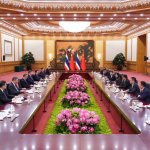
At the gathering of G7 countries in Hiroshima over the weekend, the assembled leaders of the world’s richest countries managed to put together a collective, yet veiled response to Chinese “economic coercion” and aggressive posturing in the Indo-Pacific. While not forgetting the ever-present war in Ukraine, evidenced by the presence of Volodymyr Zelenskiy, regional concerns dominated the weekend. It was a clear message to Chinese President Xi Jinping that changes in the geopolitical status quo would not be tolerated, or worse that the G7 would act with the same determination in Taiwan as it has in Ukraine. However, despite the message of unity, at home, many of the G7 members have challenges that threaten to overwhelm efforts to quell turmoil in the region.

U.S. President Joe Biden, while embracing training Ukrainian fighter pilots on American-made F-16 jets and who recently announced a $375 million military aid package, which includes artillery, ammunition and HIMARS rocket launchers, in addition to the more than $37 billion already spent since the Russian invasion began, is facing growing scrutiny at home. Republicans, as the 2024 Presidential campaign heats up, will continue to press the issue of the utility of US support for Ukraine. Both Florida Governor Ron DeSantis and former President Donald Trump have already called into question Biden’s support, even suggesting that it is not “vital” to US national security interests. Ukrainian aid also runs counter to US domestic turmoil, where another debt ceiling debate forced Biden to cancel a Quad meeting in Australia and a historic first-ever meeting in Papua New Guinea. Attending both would have boosted American visibility in the region, and sent an important message to Indo-Pacific countries that the United States is a steady, trusted, and reliable partner. Abandoning the Papua New Guinea meeting gives China fodder for a legitimate counter argument.
Indian Prime Minister Narendra Modi was also a visible presence at the G7, but despite the first face-to-face meeting with Zelenskiy, is likely to have to walk a careful line between calling for the end of the war in Ukraine to managing New Delhi’s relationship with Russian President Vladimir Putin. India between 2018 and 2021 spent more than $5.5 billion on arms from Moscow, including Sukhoi fighter jets and Mi-17 transport helicopters. It is also a major purchaser of Russian oil and gas, which provides an economic lifeline to a heavily-constrained Putin government. Modi has not indicated that he would use this leverage as a means to ending the war, although it has continued to supply humanitarian aid to Ukraine. Past United Nations resolutions where India has abstained on condemning the Russian invasion are still indicators of its precarious position. Analysts who suggested that New Delhi was becoming frustrated or impatient with the pace of conflict in Ukraine by noting Modi’s message to Putin to “move on to a path of peace” during the Shanghai Cooperation Organization (SCO) Summit in Uzbekistan last September, might be premature, as India has yet to diversify its weapons procurement and has only begun a major energy transition, a key component of its 2023 G20 leadership.
For both Germany and France, messages on China have been conflicting and arguably distracting. French President Emmanuel Macron’s recent comments and diplomacy with China have complicated EU strategy, arguably putting French national security and “strategic autonomy” above that of a unified and coherent European strategy. Worse, he recently touted China’s “diplomatic genius” while it attempted to sow discord across the European continent. Therefore, it is peculiar that Macron would endorse a veiled threat toward China, while projecting an altogether different message not too long ago. The message of unity, both in Ukraine and China are noteworthy, but such a masculine position was not a part of his much criticized recent trip to China. Germany, while leading the effort with Japan to change the G7’s approach to the Global South, also has to tread water on China, evidenced by German Chancellor Olaf Scholz’s careful rhetoric on economic cooperation.
For all of the concern about Chinese “economic coercion”, the G7 statement might actually be less useful than projected. China’s attempt at economic bullying in Australia didn’t go so well, and some Indo-Pacific states have found ways to counter China’s attempt at exerting influence, including Sri Lanka and Fiji. While it is important to build a stronger G7-led rules-based international order, the task could easily be accomplished simply by continuing to build trade frameworks and agreements like the Indo-Pacific Economic Framework (IPEF), shoring up supply chains, and boosting maritime security. Unfortunately, these unity messages also have domestic audiences in mind, which can inflame nationalist tendencies and reduce incentives for dialogue. A better approach should have been to steer the language in the direction of small states, who are more vulnerable to coercive activities. Unfortunately, that’s a missed opportunity.






